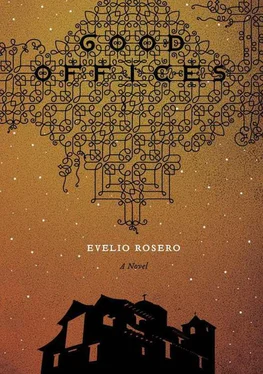Silence followed the confession.
“Let’s drink,” San José said at last, alight. “God has granted us that pleasure.”
He got to his feet, coming back to life, and drained his glass. Then he raised one hand as if blessing Tancredo.
“Nothing that has been said here has been proven,” he said. “We won’t lodge a complaint. Almida and Machado are without stain until God shows us they are not. God is Peace. His Peace proceeds from his presence. In the end, justice will be done, just as He predestines. We have faith in His designs, at least for now.”
“For now?” Tancredo said to himself. “What does he mean by ‘for now’?”
Complete silence surrounded them. There was no sign of the Lilias in the night. Sabina would still be beneath the altar.
“I’ll go to her.” The Father heaved a sigh. “To Sabina. I’ll take her a glass of wine.”
In fact, he already had a glass of wine in his hand. He seized the only burning candle in the other.
Tancredo remained frozen in his seat. He wanted to say something, to warn the Father, but it was impossible. He felt nauseous and, simultaneously, had the urge to laugh.
“I’ll go to her,” the Father repeated. “No one else must find her beneath the altar; what would her godfather, Celeste Machado, do? He’s a bad-tempered man, I know him all too well.” He rubbed his exhausted face. “What I’ll say to her, I do not know. I’ll sing her that poem by Saint Teresa of Avila.” Here Matamoros put his lips close to the hunchback’s ear and recited: “Let nothing disturb thee, nothing affright thee, all things are passing, God never changeth, patient endurance attaineth to all things, who God possesseth in nothing is wanting, alone God sufficeth.”
When he finished reciting the poem, he began to sing it softly, like a faint peal of laughter, and so left the kitchen, a procession of one, carrying away the light.
Tancredo didn’t want to follow the Father, he could not or it did not occur to him; nothing disturbed him, nothing affrighted him, and he drank, God never changed, and he drank again, God alone sufficed. He imagined Sabina confronting Father Matamoros, oh Lord, she would throw the statue of Saint Gertrude in his face, at the very least she would scream, or cry, and he smiled, but what time was it? Midnight? Time, time, time is beyond belief, and Almida not back, where do the cats live, where were the Lilias, where was the world, here, there? In the darkness he scoured the kitchen, feeling his way from memory over every corner, every cooker, every chair; there were no cats, no Lilias, in what other universe would they settle their differences, their mutual vigilance? He remembered them spying on each other: the Lilias on the cats and the cats on the Lilias, a truly unusual enmity, he thought, how had I not noticed it? With that, as if he had invoked it, he heard a distant miaow, like an answer, a miaow that was not characteristic of idleness, of pleasure, but a chilling, blood-curdling miaow. The cats, he thought, the cats are alone, and he went out into the courtyard: the darkness stretched in every direction, the silence, the cold. Then, greeting him, a nascent moon slid from between the storm clouds and colored the corners gray. He heard a splash, the subtle shuddering of water, and in the distance he made out, as though being reborn in the darkness, the three Lilias around the laundry sink, leaning over it, their outstretched arms submerged, but still.
Each was drowning a cat in the freezing water.
From time to time the waters stirred, shuddering, appropriate for death; in the silence little waves rose up, multiplying like storms, because the arms emerged, each pair with their cat, a shadow with paws, panic-stricken, still struggling. The arms plunged them in again, time after time, so slowly, the shadows dripped, defeated, and again the arms and shadows emerged, the shadows not expressing their terror, the arms paralyzed by fatigue, the cats floppy, as if asleep, more dead than alive, but alive, because one of them shook its head, so they submerged them again, until finally hauling them out, stiff as hieroglyphs. “My dear departed,” one of the Lilias said, looking around. In the moonlight the other milk-white faces of the Lilias were seeking — what were they seeking? What were they questioning in every corner, in every otherworldly gesture moving things aside, in the wide courtyard gates that opened onto the street, in the garage, in the walls topped by broken bottles, the sharp glass cemented in to cut the hands of thieves, what were they seeking? Their arms let the shadows fall onto the stone surrounding the sink. Their gazes returned to the inner wall separating the courtyard from the garden, the oldest wall, the one made of adobe.
“How are you, Tancredito?” they asked.
They always knew where he was, and when, and why, without needing to see him.
Tancredo’s eyes held the most perfect curiosity, but also age-old mistrust; he had endured his own version of the ceremony at the immense stone sink, where once upon a time the Lilias had bathed him and Sabina, naked, as children.
“Why drown them?” he managed to ask, approaching the Lilias.
“How could we not drown them?” they replied, pointing to the six defeated shadows on the edge of the sink. “We warned them ages ago. One of you is asking for it, we told them; you don’t let us cook, you drive us to despair with your stealing, we fill your stomachs and you steal, we take away the food and you steal more, what are we to do, cats? Cats like you had never happened to us before, especially you, Almida.”
And they pointed at one of the shadows on the stone.
To Tancredo they seemed like strangers. Other women: three demented old ladies from five hundred years ago, alive, but reconstituted from scraps, cobwebs: talking corpses.
“Help us, Tancredito,” one of them pleaded with great solemnity. “Help us bury them. They were asking for it. Imagine, one of them ate Father San José’s little rabbit, the little rabbit no less. And what time was that, when we didn’t notice? At what time did he gobble up that little rabbit that was so good and that we spent so much time over and put so much love and patience into, because we knew it was meant for a saint?”
Another interrupted, whispering: “If he’d only eaten some crackling, big chickens and little ones, every now and again, like he’d been doing before, that would have been fine. But he dared to go for the rabbit, and that was too much. He behaved badly toward us, see. May God forgive us this execution, which is for the good of the parish.”
Agile for their years, the three Lilias chose a faraway corner next to the wall, armed themselves with shovels and began to dig. Fascinated, Tancredo observed their work, their desperation, their increasing slowness, their clumsy legs, the desolation in their words: “How they’ve made us suffer,” they said, and went back to the task in hand, until they weakened, hands on hips, gray heads directed toward the cats, “How shameful that business with the priest,” they said to them, “aren’t you sorry? We’ll never forgive ourselves that the little rabbit for him and him alone ended up in one of your stomachs, but which one? The innocent often pay for the guilty, oh wicked devils. Almida, it must have been Almida,” they said, “it’s this one, he looks alive, it’s this one, this one, he laughs, he’s laughing.”
They suddenly seemed afraid. And, between complaints, dedicated themselves to pummelling the shadowy Almida with their fists. The Lilias’ complaints were his own suffering made flesh, Tancredo thought: just like him, a whole lifetime of service with nothing on the horizon but a whole lifetime of service.
“Father Matamoros is waiting for you,” he said.
Читать дальше












